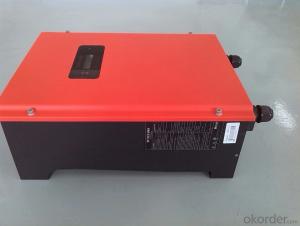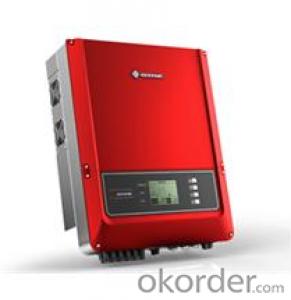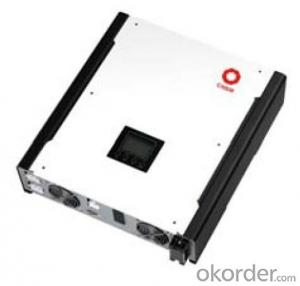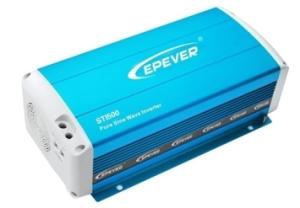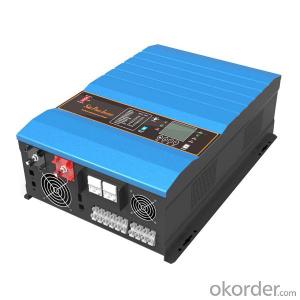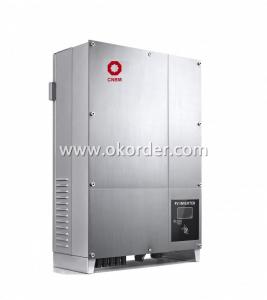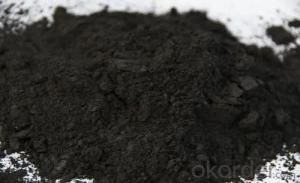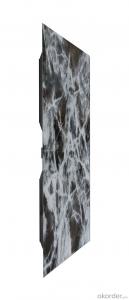Solar Inverter Off-Grid Type Solo-50 Series
- Loading Port:
- Shanghai
- Payment Terms:
- TT OR LC
- Min Order Qty:
- 10 unit
- Supply Capability:
- 1000 unit/month
OKorder Service Pledge
OKorder Financial Service
You Might Also Like
Product Description:.
This system can keep 3 energy-saving bulbs with 9W working 5 hours per day and a 5W radio working 4 hours a day.
Output voltage: 12V d. c.
It can work for 3 successive rainy days.
● System voltage:12V
Ø
● Charge and discharge current:10A
● Power:50W..
● Dimensions of box:300*220*270mm..
Ø
● Net weight of the box:5kg
Product Datasheet:
Main Accessories | Specifications | No. | Notes |
Box | High-quality rolled steel | 1 | Standard enclosure, optional colors |
PV modules | Polysilicon 50Wp | 1 piece | Optional |
Storage battery | Lead acid, maintenance-free,60Ah | 1 piece | Optional |
Controller | Solo-LS1024S 10A | 1 unit | Standard |
PV accessories shelf | Simple type | 1 set |
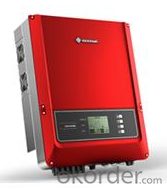
Product Advantages:
Powered by DC current
Can used out of doors
High effiency and low noise
FAQ
What is your payment terms?
We accept T/T payment, normally we need 20% T/T in advance, 80% payed before shipment.
What is your packing system?
We put the sistem in the wooden box.
Can you do OEM service?
Yes we can, but we need to do it with a certain order quantity.
- Q:Can a solar inverter be used with a solar-powered air conditioner?
- Yes, a solar inverter can be used with a solar-powered air conditioner. A solar inverter is responsible for converting the direct current (DC) electricity generated by solar panels into alternating current (AC) electricity that can be used to power appliances. In the case of a solar-powered air conditioner, the solar inverter would be essential for converting the DC electricity generated by the solar panels into AC electricity to run the air conditioner.
- Q:Can a solar inverter be connected to the grid?
- Yes, a solar inverter can be connected to the grid. In fact, connecting a solar inverter to the grid is a common practice in solar energy systems. The inverter is responsible for converting the direct current (DC) produced by the solar panels into alternating current (AC) that can be used by homes or businesses or fed back into the electrical grid. This allows solar energy systems to generate electricity for consumption while also contributing excess power to the grid.
- Q:Can a solar inverter be connected to a battery backup system?
- Yes, a solar inverter can be connected to a battery backup system. This allows the solar power generated during the day to be stored in the batteries and used during times when there is no sunlight or during power outages.
- Q:Can a solar inverter be used with different types of solar panels (monocrystalline, polycrystalline, thin-film)?
- Yes, a solar inverter can be used with different types of solar panels, including monocrystalline, polycrystalline, and thin-film. The key factor is that the solar panels need to have compatible voltage and current ratings with the inverter. As long as the specifications match, the inverter can efficiently convert the DC power generated by any of these solar panel types into usable AC power for various applications.
- Q:Can a solar inverter be used with a solar-powered food dehydrator?
- Yes, a solar inverter can be used with a solar-powered food dehydrator. A solar inverter is responsible for converting the direct current (DC) produced by solar panels into alternating current (AC) that can be used to power electrical devices. Since a solar-powered food dehydrator typically requires AC power, a solar inverter is necessary to convert the DC power generated by the solar panels into the appropriate form for the dehydrator to function.
- Q:What is the role of a solar inverter in a residential system?
- The role of a solar inverter in a residential system is to convert the direct current (DC) electricity generated by the solar panels into alternating current (AC) electricity that is suitable for use in the home. It also manages the flow of electricity, monitors the system's performance, and ensures safety by providing protection against electrical faults.
- Q:How does a hybrid solar inverter work?
- A hybrid solar inverter works by converting the direct current (DC) electricity generated by solar panels into alternating current (AC) electricity that can be used to power appliances and equipment in a home or business. It also has the ability to store excess electricity in batteries for later use. Additionally, it can draw electricity from the grid when solar power is not sufficient, ensuring a continuous power supply. Overall, a hybrid solar inverter maximizes the use of solar energy and provides flexibility in managing electricity consumption.
- Q:Can a solar inverter provide power during a blackout?
- No, a solar inverter cannot provide power during a blackout.
- Q:Can a solar inverter be used in a solar-powered street lighting system?
- Yes, a solar inverter can be used in a solar-powered street lighting system. The solar inverter is responsible for converting the direct current (DC) generated by the solar panels into alternating current (AC) that is required to power the street lights. It ensures that the energy produced by the solar panels is efficiently utilized in the lighting system.
- Q:Can a solar inverter be used in a floating solar system?
- Yes, a solar inverter can be used in a floating solar system. In fact, a solar inverter is an essential component of any solar power system, including floating solar systems. The purpose of a solar inverter is to convert the direct current (DC) electricity produced by the solar panels into alternating current (AC) electricity that can be used to power electrical appliances or be fed into the grid. Whether the solar panels are installed on the ground, on rooftops, or on a floating platform, a solar inverter is necessary to ensure the efficient and safe conversion of solar energy into usable electricity.
1. Manufacturer Overview |
|
|---|---|
| Location | |
| Year Established | |
| Annual Output Value | |
| Main Markets | |
| Company Certifications | |
2. Manufacturer Certificates |
|
|---|---|
| a) Certification Name | |
| Range | |
| Reference | |
| Validity Period | |
3. Manufacturer Capability |
|
|---|---|
| a)Trade Capacity | |
| Nearest Port | |
| Export Percentage | |
| No.of Employees in Trade Department | |
| Language Spoken: | |
| b)Factory Information | |
| Factory Size: | |
| No. of Production Lines | |
| Contract Manufacturing | |
| Product Price Range | |
Send your message to us
Solar Inverter Off-Grid Type Solo-50 Series
- Loading Port:
- Shanghai
- Payment Terms:
- TT OR LC
- Min Order Qty:
- 10 unit
- Supply Capability:
- 1000 unit/month
OKorder Service Pledge
OKorder Financial Service
Similar products
New products
Hot products
Hot Searches
Related keywords
